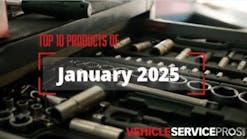Ford adds Bendix electronic stability to medium duty vocational trucks
The Bendix ESP Electronic Stability Program provides the safety and reassurance of full stability on more than a half-million commercial vehicles sharing North America’s roadways. Now, for the first time, Ford Motor Company is offering the road-proven technology on its medium-duty vocational truck models. Bendix ESP will come standard on all 2018 model year F-650 and F-750 tractors, and is available as an option on certain F-750 straight tuck configurations.
“The versatility and dependability of Ford’s F-750 and F-650 trucks are recognized across the industry, from delivery applications to heavy towing jobs, and we’re proud that Ford has selected Bendix ESP to strengthen the safety and reputation of these trucks,” said Scott Burkhart, Bendix vice president – sales, marketing, and business development. “Additionally, implementing the technology now puts Ford well ahead of the curve for meeting the upcoming full-stability mandate for this vehicle class.”
Bendix, the North American leader in the development and manufacture of leading-edge active safety and braking system technologies, introduced Bendix ESP in 2005, making it the first full-stability solution widely available for the commercial vehicle market. Bendix ESP provides full compliance with the National Highway Traffic Safety Administration (NHTSA) stability mandate, which requires full-stability technology on most new Class 7 and Class 8 tractors beginning August 2017 for 6x4 tractors, and finishing for most other Class 7 and Class 8 tractors by August 2019. Depending on the particular Class 7 tractor specifications, Ford tractor models will meet the requirements with Bendix ESP. Also, Ford will make Bendix ESP optional on their single-unit platforms for vocational applications.
Full-stability systems utilize more sensors than roll-only stability or antilock braking systems, making it possible for the technology to more quickly recognize factors that could lead to vehicle rollovers or loss of control, as well as address both roll and directional stability. On dry surfaces, full-stability technology recognizes and mitigates potential rollover and loss-of-control situations sooner than roll-only options, and it functions in a wider range of driving and road conditions, including snowy, ice-covered, and slippery surfaces.
When intervention is necessary, full-stability systems can not only de-throttle the engine, but selectively brake on the steer, drive, and trailer axles. Roll-only systems typically apply the brakes on only the drive and trailer axles. Slowing the vehicle quickly helps mitigate rollovers faster, and can help the driver maneuver in loss-of-control situations.
“When you consider the costs and consequences associated with crashes – and rollovers in particular – it becomes quickly clear how valuable full-stability technology is in today’s environment,” Burkhart said. “And we regularly hear from fleets that have seen a 50 to 70 percent reduction in rollovers and loss-of-control accidents when Bendix ESP is equipped. By making these systems available to its medium-duty truck customers, Ford is making a strong statement about its commitment to the safety of those at the wheel of its vehicles, and everyone who shares the road with them.”
Bendix also provides air-braked medium-duty Ford trucks with antilock braking systems (ABS), air compressors, air dryers, and valves.

